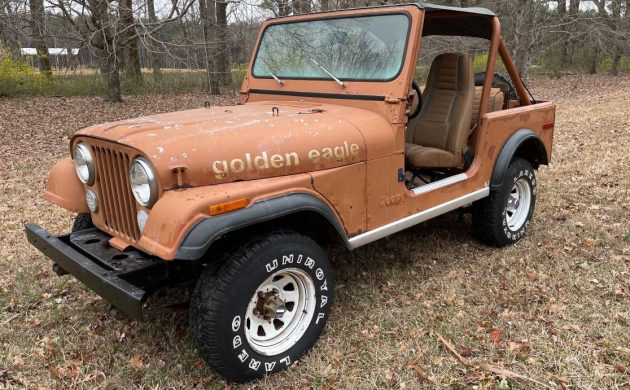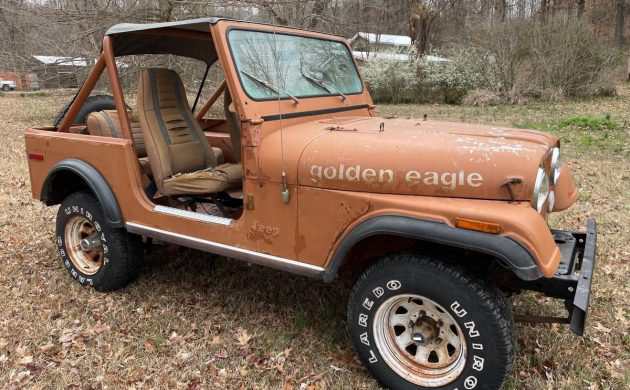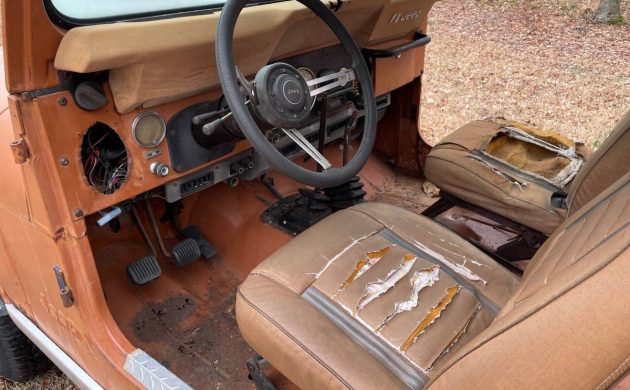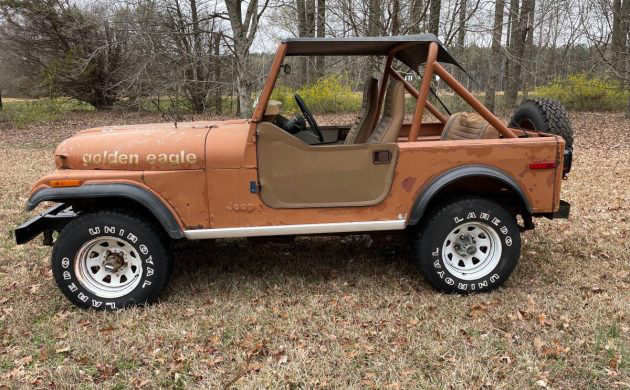
I always admire a seller who is candid about the classic they are trying to shift to a new home. Viewing the vehicle through rose-colored glasses is easy, but listing its various faults and shortcomings can be difficult without driving away potential buyers. That brings us seamlessly to this 1980 Jeep CJ-7 Golden Eagle. The seller admits it runs and drives, but the buyer will take it home on a trailer. There will be hours of rust repairs, but the problems don’t appear insurmountable. If you feel up for the challenge, the Jeep is listed here on Craigslist in Charleston, Mississippi. The seller set their price at $7,500 OBO, and I must say a big thank you to Barn Finder Charles F for spotting this wonderful off-roader.

The CJ-7 joined the Jeep range in 1976 as a physically larger evolution of the CJ-5 model. The company increased its predecessor’s wheelbase by a foot and its overall length by ten inches. This endowed the vehicle with increased interior space, while changes to the side openings made hinged doors a viable option. Several special editions formed part of the lineup during the CJ-7’s production life, with the Golden Eagle available from 1976 until 1980. This Golden Eagle would have been one of the last built, and even a quick glance at the supplied photos confirms it needs plenty of attention to recapture its former glory. The Russet Metallic paint is tired, and the original color-coded wheels are gone. There is rust requiring attention, with the floors the most critically impacted. However, with complete one-piece floor pans retailing for under $800, dismantling this Jeep for a frame-off restoration is a viable option. There is visible exterior rust, but like the floors, replacement steel to address the problems is readily available and affordable. The panels are surprisingly free from bumps and bruises, and the trim is acceptable for a driver-grade build.

I admire this Jeep’s consistency because its interior requires as much attention as its exterior. The seats and foam have seen better days, and the new owner’s approach will depend on their desire for originality. Upholstery kits to refresh the buckets and rear seats retail for around $580 in the correct material, although new foam is also required. Alternatively, ditching the originals for body-hugging aftermarket seats would improve comfort and support when the terrain becomes rugged. Sadly, someone has hacked holes in the dash for what I assume were speakers, and the result is pretty ugly. Welding in new steel is possible, although fitting another set of speakers would disguise the problem. The factory air conditioning is a welcome surprise, but the lack of a compressor pulley suggests it hasn’t blown cold in many years.

Lifting the Jeep’s hood reveals the AMC 258ci six that churned out 112hp and 205 ft/lbs of torque in its prime. Neither figure sounds particularly impressive, but these engines are exceptionally flexible, with peak torque delivered below 1,500 rpm. The power feeds to the road via a four-speed manual transmission and a Dana 300 dual-range transfer case. The original owner didn’t splash the cash on power brakes, but the power steering should improve maneuverability in tight situations. The news on the drivetrain front is predominantly positive, with this CJ-7 running and driving and the four-wheel drive system working as it should. However, the seller indicates the vehicle isn’t roadworthy, and the new owner will take this baby home on a trailer.

The photos tell the story of this 1980 Jeep CJ-7 Golden Eagle, confirming it requires deep dedication if the new owner plans to recapture its former glory. However, there are no rust issues that are beyond repair, and an enthusiast with respectable welding skills could tackle them in a home workshop. That raises the question of the seller’s price and whether the project is financially viable. If someone handed the vehicle to professionals and said, “Fix this,” it probably wouldn’t be. However, finding a tidy and rust-free example for under $30,000 in the current market is almost impossible. Therefore, I believe it would be worth the effort if the buyer is hands-on in their approach. Are you tempted?



did that work?
Ha! Miracles do happen, if you push enough buttons. I found a pic of my ’51 Willys with the SBC, and I realize the irony of my views on SBCs in other vehicles, so don’t bother pointing that out.
The CJ here is probably the most refined CJ, and pretty typical of what you will find. A clean, non-abused CJ would be a cause for alarm. However, it’s still a CJ, and we’ve come a long ways in Jeeps. People still trying to cash in on the Jeep craze, and hate to break it to the, but the steam has run out on CJs, with so many better offerings, this will be a tough sell. The good news, is you’ll make new friends on 1st name basis at the AutoPlace store, most parts are still around, so a credit card with no limit is paramount. While the CJ was clearly a step up from my old Willys, my YJ is again as refined, and having had the YJ, I’d never go back. See how that works in America? Still a good, not great find.
There was a time, thirty years ago, when a CJ was THE hot car for the young set. That included young females; and that I have never fully understood. In 1970, the year AMC took it over, a CJ (then called “Universal,” CJ was just a series code, like B-Body) was the province of gas stations and small-town DPWs. You expected to see one pushing snow off parking lots after an overnight dumping. You expected to see the Fish-And-Game officer drive up in one, while you’re dressing your bagged deer – demanding to see your permits.
The changeover, I remember it, was 1973. That was the year the Renegade sub-model was introduced, with hood graphics, cast wheels, fender flares.
1975 gave the CJ-5 (the CJ-6 was still on the order books, but nobody but foreign armies bought any)…the CJ-5 Renegade got the Levi’s seats.
And then…the magic of a CLOSED-IN Jeep, the new-in-1976 CJ-7. AMC went to great pains to ignore that it was just a reshaping of the old Jeepster/Commando wagon – the door character lines and cutouts, recalled the C-101 and C-103; and the rear liftgate, although more squared off, had the same general lines.
The kids loved it. I know – our city’s AMC dealer, who was forced to take on Jeeps (up to that point it had been a burden for dealers) had a boy in my grade in high school. Jeff drove a demo CJ-7 Renegade, and everyone loved it.
It put Jeeps in a whole new light. A less-connected classmate of ours had gone down to the Post Office and bought a surplus DJ-5A – the first Postal Jeeps, with the conventional Jeep grille. Kids were suddenly interested in HIS.
AMC had hit a home run. With a car that, let’s face it, was pretty crude. While the YJ is an obvious relation (and you can dress a YJ in CJ garb, I’ve done it) it had refinements never given the CJs, ever. Panhard rods to keep axles from shifting side-to-side, just one.
BUT. Two things you can bank on. Memories fade, and Jeeps rust. Both have happened – the last CJ-7 was made 39 years ago; and rust never sleeps. Garage queens and museum displays are out there, but not much else. A number of makers used to supply fiberglass tubs to fit on rusted CJ frames; but IIRC, DaimlerChrysler stopped that with cease-and-desist orders.
A kid who could have lusted for a used CJ in, say, 1990…is now no kid. His own kids are maybe out of high school. And quite likely they’ve never seen a “Jeep” that didn’t have airbags.
It’s depressing, but time does move on. It’s more than just a fad-vehicle fading in popularity – the original CJ models were based on the Army-designed M38A1, designed – by the Army, aided by Willys, but Army oversight and money – as a military mobility unit.
Form follows function.
And even after the armies of the world moved on to the M151, the CJ version kept on. Dated, but with legitimate pedigree.
Great story JPT! I vividly remember those daze, when the coolest drove either a CJ, Bronco, Blazer or in my case Scout II TERRA. That was a very capable truck with a 7’ bed and 2,000 lbs capacity or 8,000 lbs tow rating like mine with the available 345 International truck/bus engine, with HD 727 automatic, HD 2speed BW transfer, with 3:52 Detroit Locker rear and limited slip front. Taking advantage at the time with cheap gas.
The correct meaning for CJ meant “Civilian Jeep” and was applied to those produced for the general public after WW2.
Correct on the meaning of “CJ” but it’s not always rock-solid sure. As AMC reorganized the Kaiser businesses, the military and government products were put into a new entity, AM General. They made the last orders of M38A1s, the M151s (Ford also made the Mutts) and the ubiquitous DJs. And military trucks.
Jeep Corporation made the retail stuff; but also sold CJ-6s to Middle Eastern governments, and CJ-8s (Scramblers with World Cab steel hardtops) and CJ-10s (CJ-8 pickups with separate beds, like Land Cruiser trucks) worldwide.
As all old CJ owners know when servicing their trucks…all rules are meant to be broken.
I have to agree with you on that assessment. I had an ’85 CJ-7 back in my college days. It was a money pit. It was a good vehicle for the time in my life that I had it, but I wouldn’t want it now, especially not for a daily driver. Agree on the YJ. That was a well-deserved refinement. Where I think they dropped the ball was going with the rectangular headlights. That was a wrong move, IMO.
@JustPassin Thru- The CJ6 was also sold here to the general public though they were poor sellers, and most were sold to the US Government Forest Service. My brother is currently restoring one just to have something different other than the usual CJ5 and CJ7.
Yes, until 1976. The CJ-6 was available only for export, 1976-81.
The Egyptian army bought a large order – and then, with Renault in control, the Egyptian government opened a plant under license to make Jeep variants.
my dream jeep !
id re-upolter the seats, new GoodYears, oil it up and keep it just like that :)
This really isn’t too much work, and that 258 is pretty bulletproof, but jeeps have always commanded high prices which weren’t affected as other vehicles started skyrocketing past them. I could see this selling for $5k. For the buyer, keep in mind that 1976-1995 (so CJ7 and YJ) are for the most part interchangeable when it comes to body panels, tops, etc.